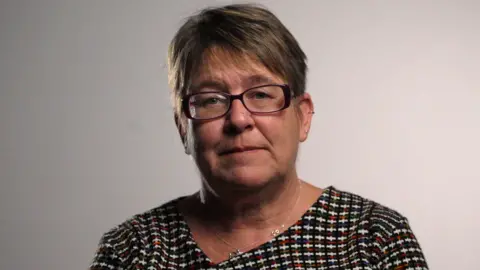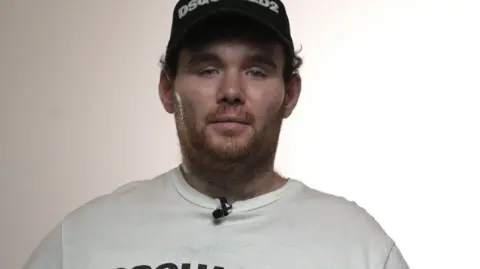Luke Orton was playing in a rugby tournament on the Isle of Wight in July 2023 when his life changed forever.
“I went in for a tackle and heard my neck snap,” he said.
“It sounded like eating a cracker or a dry Weetabix – it turned out to be the guy’s knee who I tackled – then I was paralysed on the beach.”
He is one of several patients receiving specialist rehabilitation treatment at Salisbury Hospital’s Spinal Treatment Centre.
As the unit marks its 40th anniversary, BBC South spent six months with the staff and patients. These are some of their stories.
‘One wrong move’
Roxy Wilson, from Sherborne, Dorset, was in the crowd for Elton John’s set at Glastonbury last year when she says people suddenly surged and she was knocked over.
She needed surgery to remove a disc in her spine that was crushing her spinal cord.
“It was a case of one wrong move and it would have severed my cord,” said Roxy.
“Unfortunately, when they went to remove the disc, all the flow of blood and oxygen and everything just stunned all my nerves and I ended up paralysed.”

After four months on the unit, Roxy was able to stand with support, meaning she does not have to use a wheelchair full-time.
“I’m going to walk out of here now, no doubt, I’m going to walk out,” she explained.
And five months on from her accident, she did just that, breaking into a broad smile as staff and patients cheered and clapped.
“All of a sudden I feel like I’m 10ft tall, not 5ft 8in,” says Roxy. “I think there’s every emotion possible – I’m scared and I’m going to miss this lot.”
While teams at the unit work on rehabilitating people with spinal injuries, not everyone will walk again.
Consultant Chalil Vinod said: “Patients are under the impression that a lot of physiotherapy can enable them to walk – and I dispel that myth.
“In a traumatic spinal injury, when the spine is fixed – that’s the bony bit fixed – but they forget there’s a nervous bit and once that’s damaged, it’s beyond repair.”
To help people cope with the often life-changing outcomes of their spinal injuries, patients are given support with mental resilience alongside their physical rehabilitation.
Dr Nigel North, clinical psychologist, said: “You can’t take away hope. We can’t leave someone hopeless by saying this is never going to change because that would be an absolutely terrible position to leave someone in.”
For many, the healing journey involves grieving the loss of their life before their spinal injury.
“You’re mourning something which has gone and you’re not going to get it back in the way that it used to be,” said Dr North.
‘Everything was fuzzy’
Patient Fearghas Powell said: “I feel like I moan a lot but it’s because I’m just impatient with this life, I want my old life back.”
The tree surgeon was removing rotten branches from a tree in Yelverton, Dartmoor, in August 2023 when he fell 46ft (14m).
“I was hanging there for a second then I heard a click or a clunk and then I woke up on the floor,” he said.
“I didn’t have any pain straight away, I couldn’t see, everything was just fuzzy.
“I fell from about 14m (45.9ft) I think, which is way bigger than a two-storey house.”
For Fearghas, the focus of his rehabilitation is upper body movement and strength.
He has some sensation below the waist but his leg use is very limited, with no feeling or movement below the knee.
A year on from the accident, the tree surgeon from from Plymouth, Devon, found the courage to go back to the site of the accident.
Gazing up at the tree he fell from he said: “I was nearly crying this morning because it just felt like too much but, now I’m here, I feel quite sick.
“It’s just weird. My whole life has changed now – from that tree.”
‘Got to push forward’
Following his rugby accident, Luke, from Ventnor, Isle of Wight, needs regular physiotherapy.
Initially told he might only have the use of his biceps, he is also building strength in his triceps and wrists.
While he will never regain the use of his legs, Luke is determined to get on with his life.
“If I sit there in bed going, ‘Oh, I’ve lost my legs for the rest of my life’, then I’m not going to go anywhere,” he said.
“You’ve got to push forward, carry on with the life you probably had before but it’s just going to be different. At the end of the day, I’m still the same person.”

The impact of a spinal injury goes beyond physical and mental rehabilitation.
Annamarie broke three vertebrae in her spine when she fell down a flight of stairs, leaving her without feeling from the chest down.
During her time at the spinal unit, her teenage daughter had to move in with her grandmother and Annamarie’s father passed away.
“It’s a lot, you can’t even be there for your family, you’re quite removed from everything that’s going on, which is quite hard,” she said.
Eighteen months on from her accident, Annamarie has made amazing progress.
She is now able to walk with support and move into an extra care unit in Romsey, Hampshire, close to her family.
But she is struggling to find somewhere suitable for her to eventually live with her daughter again.
‘I was completely paralysed’
Caroline Burson, from Alresford, Hampshire, was on holiday in Cyprus last summer when her arm “went completely dead”.
She waited with her partner for a taxi to take her to hospital but “by the time it arrived, I was completely paralysed from the neck down”, she said.
Initially doctors thought she had sunstroke, says Caroline, but an MRI scan revealed it was more serious and she was flown back to the UK by air ambulance.
Caroline had suffered a spinal stroke. A clot had disrupted the blood flow to her spinal cord.
During Caroline’s time at the unit, she progresses from supported walking to independent movement.
“I was told there was no recovery,” she said, describing the feeling of being able to stand up unaided as “just unbelievable”.
“I said when I came here, I’m going to walk out of here – and I am,” she said.
And eight months after her spinal stroke, she leaves the unit on foot – with the aid of a walking stick and immense pride.

